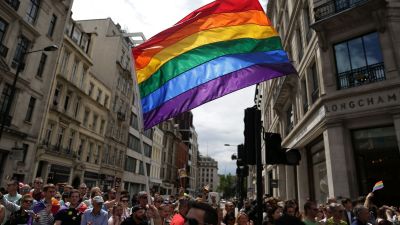LGBTQ+ history: Celebrating 18 years of Section 28 repeal

It's been eighteen years since the repeal of Section 28 in England and Wales but the harms are still being felt by people in the LGBTQ+ community today.
The law, passed under Margaret Thatcher's tenure as Prime Minister, banned local councils from “promoting homosexuality”, including the teaching of “the acceptability of homosexuality as a pretended family relationship”.
Norena Shopland, LGBTQ+ historian and author, recalls the time when the law was passed as "horrific".
She said, "From the time Section 28 was enacted in 1988 to its repeal in 2003 not a single prosecution took place.
"But this iniquitous law was not without effect. For example, libraries, museums, and archives were banned from 'promoting' homosexuality, the legacy of which is that is even today it is difficult to name a museum that includes LGBTQ+ people in their permanent galleries."
Norena believes Section 28 had a "huge impact", particularly for school children at the time because anyone who was being bullied (for their sexuality) [...] couldn't turn to their teachers for support."
Jenny-Anne Bishop OBE is a community organiser and trans activist from Rhyl with an interest in LGBTQ+ history.
Jenny-Anne advises the Welsh Government and the House of Commons on transgender equality as well as providing one-to-one counselling for trans people through her support group TransForum, which she founded. She received an OBE in 2015 for services to the trans community in Wales.
Reflecting on when section 28 first came into force, Jenny-Anne said she felt "very disappointed."
"We had started to get progress on lesbian and gay identities, homosexuality applied to the male population had been partially decriminalised and we were always lobbying to get the age of consent to the same as that for the heterosexual community.
"So to have a piece of legislation like this come in, was a real backward step and I'm sure affected campaigns".
Jenny-Anne also believes we can learn lessons from what has happened in the past, "because, of course, eventually, not only was the age of consent made the same, but it was no longer an offence for people to be gay in the armed services.
"And then finally, we got first civil partnerships, and then what's been called equal marriage.
"But, of course, the couples Same Sex Marriage Act made marriage for gay people legal, but it didn't make it completely equal. So that's one we're still lobbying.
"We have made great progress we mustn't forget, look, we've made some really good progress with things like the gender actually national, the Equality Act, the same sex couples Marriage Act."
Age Cymru is highlighting the importance LGBTQ+ history through a virtual reflection, celebrating the achievements of the community, while also discussing progress yet to come.
'Here and Cwiar' is a watershed discussion on LGBTQ+ history with older members of the queer community - including sociologists, historians, artists, writers, and activists.
Taking place from 4pm to 6pm today (November 18) the 18th anniversary of the repeal of Section 28 in England and Wales, the 'Here and Cwiar virtual roundtable' will welcome questions from attendees about the history of queer people in Wales.
Featuring a panel of six experts including authors, historians, and activists, the event has been carefully crafted to help attendees of all ages discover the real stories of LGBTQ+ people in Wales.
Together they will discuss topics including the devastating impact of Section 28 and the challenges faced by older LGBTQ+ people.
Meanwhile, other speakers include Mark Etheridge who is responsible for the LGBTQ+ history collection at National Museum Wales.
Currently touring Wales in search of objects related to queer history, Mark will talk about the value of recording the lives of ordinary LGBTQ+ people in Wales and beyond.
It's all part of Age Cymru's This is Older campaign, which aims to tackle negative representation and celebrate the diversity and vivacity of older people in Wales.
Victoria Lloyd, CEO of Age Cymru, says: "We are honoured to be working with such a renowned panel to host this fascinating discussion of LGBTQ+ history and lives in Wales.
"Age Cymru research has shown that older LGBTQ+ people often feel more isolated, especially those living in rural areas, and we are passionate about making sure our services are welcoming to all older people.
"We are working with care homes and service providers to ensure they understand the unique needs and issues of LGBTQ+ older people.
"On the 18th anniversary of the repeal of Section 28 we are proud to say we are a LGBTQ+ friendly charity and we are committed to creating an age-friendly Wales for everyone."
Jeffrey Weeks OBE, gay activist and sociologist said, "In my recent memoir Between Worlds: A Queer Boy from the Valleys, I look back on a Wales that refused to recognise me and people like me.
"It's a great pleasure to be in a new Wales today that thrives on diversity and can celebrate those who struggled over many years to achieve fundamental and lasting change with and for LGBTQ+ people of all ages."
Read more: